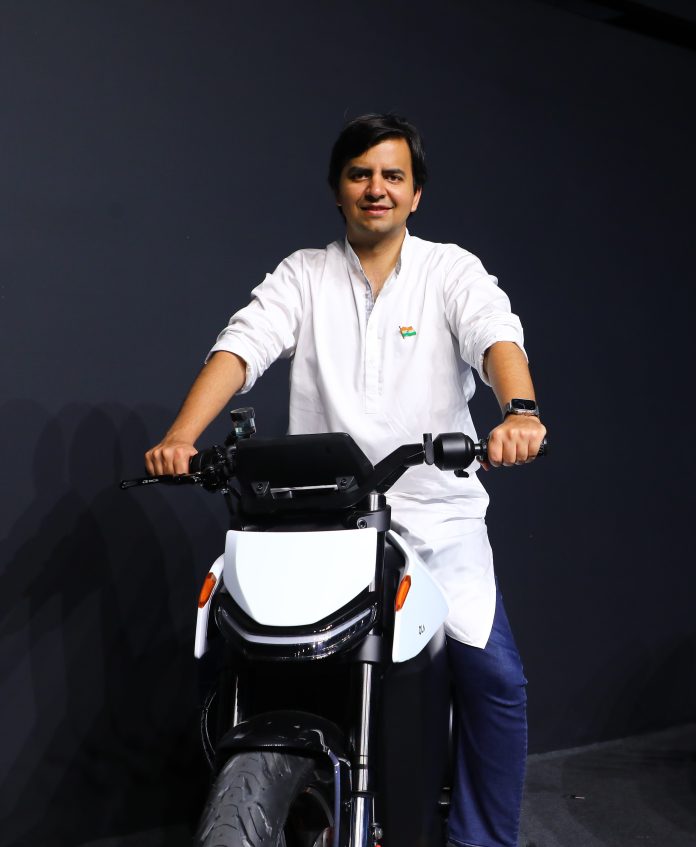Bhavish Aggarwal, looks forward to an electrifying listing of his company Ola Electric Mobility on Friday morning.
MUMBAI, Aug 7 (The CONNECT) –Bhavish Aggarwal, who has scored a hat-trick by creating three Unicorns, looks forward to an electrifying listing of his company Ola Electric Mobility on Friday morning.
The Rs 6,000+ crore Initial Public Offering (IPO) of Ola Electric Mobility was subscribed 4.26 times as the issue received bids of 1,98,14,05,530 shares against the offered 46,51,59,451 equity shares, at a price band of ₹72-76.
Bhavish created three unicorns – Krutrim AI, Ola Cabs and now Ols Electric Mobility.
He has received several accolades such as India 30 under 30 from Forbes India in 2014, Entrepreneur of the Year from the Economic Times in 2017, Top 100 Most Influential People by Time Magazine in 2018 and featured in the TIME100 Climate List in 2023 as one of the most innovative leaders globally.
For 39 year old startup entrepreneur Bhavish Aggarwal, Ola Electric Mobility is a natural progression from Ola Cabs, a ride hailing platform operated by ANI Technologies Private Limited. After the runaway success of Ola cabs, the B Tech holder from IIT-Mumbai, is out to have a big piece in the EV revolution pie.
The Ola Futurefactory is the largest integrated and automated E2W manufacturing plant in India (in terms of production capacity) by an E2W-only OEM, as of September 30, 2023, according to the Redseer Report. As of October 31, 2023, the Ola Futurefactory had an installed capacity of one million units per year. The Ola Futurefactory is an automated manufacturing facility equipped with modular and flexible assembly lines and an in-house paint shop. The in-house design, and manufacturing of our core EV components enhance our control over the optimization of EV performance and quality. These capabilities to manufacture at scale, automation, and flexible lines also enable us to improve cost efficiency across value chains through economies of scale in our supply chain, fast component development and cross-utilization of equipment across products. Furthermore, our direct relationship with suppliers and our focus on local suppliers for most of our EV components gives us enhanced control of our supply chain.
Within nine months of delivering its first EV scooter in December 2021, it became the best-selling E2W brand in India in terms of monthly E2W registrations on the VAHAN Portal of Ministry of Road Transport and Highways according to the Redseer Report.
India’s 2W production market of approximately 19.5 million units in Fiscal 2023 is primed for electrification and is expected to aid in achieving India’s promise at the UN COP 26 Summit to cut emission to net zero by 2070, according to the Redseer Report. The penetration rate of 2Ws in India is relatively low at approximately 15% in Fiscal 2023, evidencing significant growth potential within the Indian 2W market, according to the Redseer Report. Given the opportunity size and tailwinds such as lower TCO, lower emissions, and convenience, and consistent with our “India first” strategy, we view India as our core market. Over the next several years, we plan to continue to develop and launch next-generation EVs to serve a variety of price points and automotive use cases.
Says Bhavish “we intend to leverage both our existing Ola S1 platform and develop new platforms to deliver new EVs designed for use based on the target market and consumer segment to expand our serviceable market”.
Ola Electric says it is well-positioned to address this large market opportunity in EV led by our vertical integrated approach, focus on technology, R&D, execution ability and eligibility to avail certain government incentives. Globally disruptor OEMs (versus incumbent OEMs) have emerged as winners in EVs driven by a focus on innovation. Similarly, in India, disruptor OEMs have scaled well to cover more than 70% of the E2W domestic sales by volume in the first half of Fiscal 2024.




